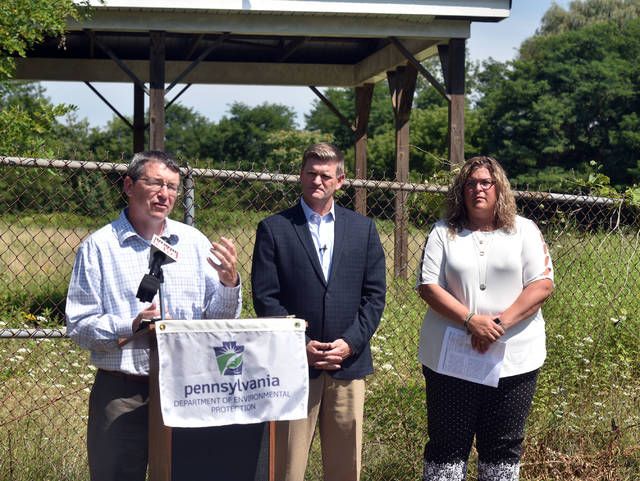Click here to subscribe today or Login.
As symbolic backdrops go, this one was dead solid perfect.
On Monday afternoon, State Sen. John Yudichak and State Department of Environmental Protection Secretary Patrick McDonnell stood before a chain link fence barring entrance to an overgrown field and rundown shed.
They were in Nanticoke to promote Gov. Tom Wolf’s proposed Restore Pennsylvania plan, and how it would help turn an old scrapyard into a recreation area.
As staff writer Mark Guydish reported, the City of Nanticoke acquired the property following the Agnes Flood of 1972, and stored equipment on it, building a soccer field with plans to turn it into a municipal park.
Well, that obviously hasn’t turned out as planned.
Yudichak said the site had been used for various industrial purposes, most recently a scrapyard, and has multiple contaminants including arsenic, lead, chromium and Selenium. Cleanup has proved too costly.
The Restore Pennsylvania plan could provide the money to move forward. McDonnell said the land would likely be restored to a partly marshy area with recreation fields and a trail, though the final decisions would be made after the money was available.
That’s where we pick up a familiar story.
The Restore Pennsylvania plan, embodied in a Senate Bill Yudichak co-sponsored along with Sen. Tom Killion (R-Delaware County), would levy a severance tax on natural gas production to generate about $300 million annually.
That money would be used to support floating a bond for some $4.5 billion, Yudichak said, which in turn would be spent on a wide range of infrastructure and land reclamation projects, such as that in Nanticoke.
If you’ve travelled widely enough around Pennsylvania, you’ll know that there are lots of Nanticokes throughout the commonwealth, communities where the pollution and debris of our industrial past linger on, creating eyesores and sometimes health hazards.
In short, we have a lot of cleaning up to do, not to mention repair of vital infrastructure that has languished thanks to years of tight budgets and deferred maintenance.
Pennsylvania has the fifth largest system of state-controlled highways in the nation, with more than 41,000 miles. It is going to take a massive influx of cash to put those roads and bridges into better repair. It is an investment that is essential to the financial well-being of this state, its businesses and residents, to keep drivers safe and keep the flow of commerce moving so Pennsylvania remains competitive.
So we’re simply going to repeat the position we took on Restore Pennsylvania back in June.
More than 30 states have enacted fees or taxes on oil and gas production, and Pennsylvania remains the largest of those which have not, the National Conference of State Legislatures has pointed out (although though the state does levy a per well impact fee).
It defies credibility to suggest that following suit would bring the sort of doom opponents suggest.
You know what else defies credibility? Believing the private sector will fix our roads and bridges out of the goodness of their hearts. They’re going to want to get paid.
PennDOT and state government have made increasing use of “public-private” partnerships, also known as P3s, which were authorized under a 2012 law, to bring a more entrepreneurial approach to funding and completing infrastructure work. But payments to those “partners” will come from tax dollars, thus out of the pockets of individuals and businesses.
Why shouldn’t drillers share more fully in that responsibility?
And, Yudichak noted, that the severance tax levied on the energy companies extracting natural gas in Pennsylvania would ultimately be passed on to mostly out-of-state residents because so much gas is sold across state lines. “About 80 percent would be paid from out of state energy users,” he said.
That is why we believe Restore Pennsylvania is a worthwhile initiative.
— Times Leader





